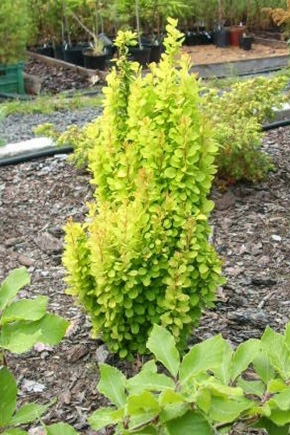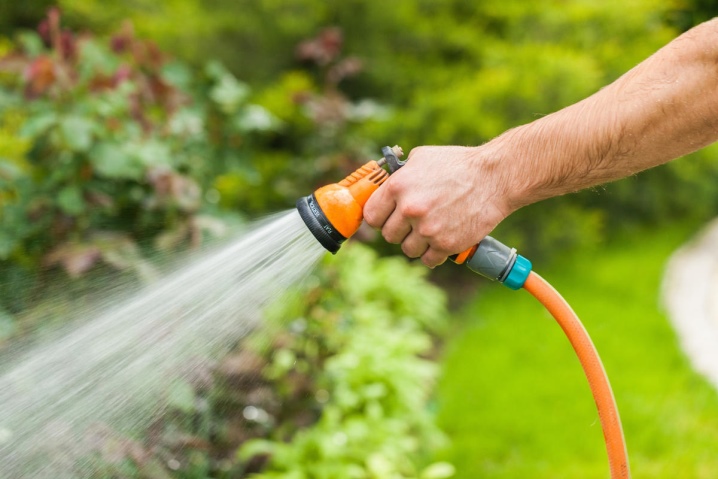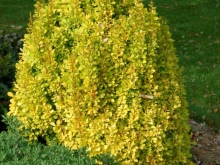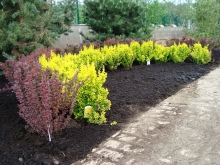Barberry Thunberg "Golden Torch": description, planting and care

For most gardeners, barberry has long established itself as a versatile, beautiful and unpretentious plant. Barberry looks equally good in large areas and in a limited area. Due to its ability to grow in both arid and northern zones, this shrub is suitable for planting in almost any area.

Peculiarities
Thunberg barberry variety "Golden Torch" is one of the most beautiful Thunberg barberry varieties. The beauty of Golden Torch foliage is difficult to describe. During the growing season, this shrub with dense branches has a bright yellow foliage. Towards autumn, the yellow color turns into bright red.

The flowering period of this barberry variety is in May. Small yellow flowers are collected in umbrella inflorescences. In height, an adult shrub can reach 1.5 meters and has a dense bark on drooping red shoots. Fruits on the bush can keep until late autumn.

How to plant?
For planting plants, both sunny and shaded areas are suitable. Preferred soil with neutral acidity. Acidic soil for planting can be prepared by adding lime or wood ash to the soil. It is better to create pits in advance so that the soil settles well. When planting single bushes, it is advisable to leave at least 1.5 meters between them, and 0.5 meters between seedlings will be enough for a hedge.

Usually, planting is carried out in the spring, before the formation of buds on the bushes. Some gardeners prefer to plant barberry in the fall in order to achieve good vegetation next year, but young seedlings are sensitive to low temperatures and therefore there is a risk of freezing in winter.

It is important to ensure good drainage of the soil, so the bottom of the hole must be covered with sand before planting the bush. Organic or mineral fertilizers can be added to the planting soil. Around the trunk, the ground is crushed and a small mound is formed. Sawdust, spruce needles, or any other organic material can be used as mulch.

How to take care of it properly?
Barberry Thunberg "Golden Torch" is quite unpretentious in its care, it does not need to be watered often or fed often. The shrub may well have enough natural moisture in the soil with natural precipitation. Only with prolonged drought is it worth additionally watering the plant. Watering is best done with warm, settled water.

Shallow soil loosening is carried out after rains or watering. Every fall, the soil is mulched with peat or compost. During the growing season, shrubs can be fed with mineral fertilizers with a wide composition.

This variety does not need annual pruning, you can either prune too long shoots or shoots with defects.

Barberry is considered a frost-resistant plant, but young seedlings, more sensitive to frost, should be covered with dry foliage or spruce paws for the first winter.

Diseases and pests
The most dangerous pest for barberry is considered to be aphid, which feeds on the juice of leaves and young shoots. The barberry aphid is located at the bottom of the leaf plate and provokes drying and wrinkling of the leaves. Subsequently, the leaves fall off, the shoots become twisted and do not have flower buds. To prevent the reproduction of aphids, it is recommended in the spring to treat the bushes with dissolved laundry soap or tobacco infusion.

The flower moth affects the fruit of the barberry. To combat it, you need to purchase solutions "Decis" or "Furanon" in gardening stores.

Among the diseases to which the Thunberg barberry "Golden Torch" is susceptible, powdery mildew can be noted, in which the leaf plates and shoots of the shrub are covered with a whitish bloom. Diseased shoots must be cut off from the bushes and the plant must be treated with sulfur-containing preparations.

Besides, barberry shrub can be affected by leaf spot. With this disease, specks form on the leaves, which lead to the subsequent drying of the foliage and shoots. Affected shoots do not tolerate winter well and can freeze out. Copper oxychloride is used to combat spotting.

Fungal diseases can also develop on the barberry shrub. If you do not treat the bush with antifungal drugs in time, then the fungus infects the bark and leads to the drying out of the plant.
More details about Golden Torch barberry can be found in the video below.
Use in landscape design
In landscape design, barberry looks great in alpine slides, rockeries and pebbles. For the design of a hedge, barberry bushes are the most successful option, since they do not require additional watering, and often formative pruning of shoots. In the garden, it is better to use a shrub to decorate the middle or distant tiers, because there are thorns on the shoots.






































































The comment was sent successfully.